- Home
- Gerald Hammond
A Shocking Affair
A Shocking Affair Read online
A SHOCKING AFFAIR
Gerald Hammond
© Gerald Hammond 1999
Gerald Hammond has asserted his rights under the Copyright, Design and Patents Act, 1988, to be identified as the author of this work.
First published in 1999 by Macmillan.
This edition published in 2019 by Endeavour Media Ltd.
Table of Contents
Chapter One
Chapter Two
Chapter Three
Chapter Four
Chapter Five
Chapter Six
Chapter Seven
Chapter Eight
Chapter Nine
Chapter Ten
Chapter Eleven
Chapter Twelve
I am very much obliged to retired pathologist Dr Bill Hendry for the help and advice pertaining to his former speciality and to my son Peter for correcting details of executry in Scotland.
Chapter One
The pleasures of retirement had worn a bit thin that morning. Weighing idleness against boredom in the scales of discontent, boredom was undoubtedly the weightier. I quite realized that my life was one for which many tired workers would have given at least one leg and possibly both, but the monotony of repetition would eventually have palled on anyone. The passing years, and a strict application of the rules, had forced me to retire from a life of responsibility, reward and, I liked to think, service. I did not take kindly to becoming a nonentity.
My wife, Isobel Kitts (née McPherson), being a zealous partner in Three Oaks Kennels, is usually out of the house and walking the mile and a half through the village to the kennels before I am properly awake. But then, although no chicken herself, she has nearly two decades in hand.
Though Isobel’s stake came from me and I am kindly allowed to help out in times of stress, I have no official connection with the firm and so am privileged to absent myself whenever I feel like it. Life, however, would be desperately boring if it were not for regular involvement with the younger and more vigorous activity at the kennels.
We had moved to Fife from Edinburgh after my retirement so that Isobel could be within reach of her few surviving relatives, only to see them depart, one for Canada and two others for unspecified destinations in the hereafter. We might have moved again, but by that time we had put down roots and made friends locally and soon afterwards Isobel was introduced to John Cunningham who, after reaching the rank of Captain in the infantry, had been retired on health grounds and was setting up as a breeder and trainer of working springer spaniels. It was vaguely envisaged, I think, that Isobel’s contribution would be as an investor, a strong back and a qualified vet, but she had then discovered an unsuspected talent for handling dogs in competition and the unflappable temperament to go along with it. The predictable outcome was that she was busy and fulfilled while I could tag along if I felt like it or stay at home and lump it. To be fair, Isobel had not consciously contributed to my discontent and was quite unaware of it.
Strictly speaking this story had begun many years earlier, but on the day when I choose to begin it I pottered grumpily, as usual, with such few domestic chores as Isobel had left undone and timed the start of my walk to Three Oaks so that the pub would be open as I passed through the village. It was a fine morning in late spring, my well-worn joints moved with comparative ease and when I called in for a large Macallan and a chaser of Caffreys my malaise had evaporated and I was in a mood for celebrating another day rather than drowning any sorrows. As it happened, I bumped into an acquaintance in similar mood and I was later than usual, and walking very tall when I left the village and tackled the half-mile to where I could already see my destination on the crest of the hill.
I turned in at the gate to the former farmhouse where lived the Cunninghams and which formed the hub of the kennels. The traditional stone buildings, more than a hundred years old, had been lovingly (and expensively) restored. Paint shone in the sun and such of the garden as was not given over to dogs was bright with flowers.
As usual, the place was bustling with activity. Away to my left, one of the kennelmaids waved to me from among the tight groups of kennels and runs, and I waved back with my stick. On the gravel in front of the house was John, a spaniel sitting to attention at his feet. I told him once that without at least one dog at his heel I might not recognize him. To the uninitiated, one springer may look very like another but I had no difficulty recognizing Spin. (Short for the Spindle Tree, Euonymus europaeus. At Three Oaks, male dogs were usually named after trees, but the supply of varieties was running short.) I had shot over Spin on many occasions during his training, walked him as often and searched him for ticks and fleas now and again. He was a talented male liver-and-white springer of nine or ten months old, more liver than white, solidly built and with a cheerful and biddable disposition.
John was talking with a scarecrow figure with a mop of silver hair and a shabby kilt. The scarecrow, I presumed, was the driver of the large Japanese jeep-type vehicle standing nearby. This latter, judging from the registration letter, was less than a year old but already it was almost as tatty as its driver and quite as battered.
John looked round as I approached. ‘Here comes one possible solution to the problem,’ he said.
The scarecrow also glanced round. From behind he had looked faintly familiar. I could now see that he was at least as old as myself. My memory for names and faces has become less positive with the passing years but alcohol, for some reason, seems to put a fresh if temporary edge on it. ‘Good Lord! Peter Hay!’ I said.
‘Good God!’ said the scarecrow. ‘It’s Henry. Henry Kitts. Right?’ The high, slightly neighing voice rolled back the years. I remembered more. Despite his eccentricities, I had always liked him.
‘Quite right,’ I said. ‘Well done, both of us. Right first time after what? Twenty years?’
‘Almost.’
We shook hands.
John was beginning to fidget. I could tell that he was dreading being trapped by a spate of do-you-remembers. ‘We can catch up with the news later,’ I said. ‘For the moment, what’s this problem I’m expected to solve? We can deal with that first and let John go. I know he’s busy.’
Peter Hay nodded towards the spaniel. ‘I’ve just agreed to buy this feller.’
‘You could do a lot worse. I’ve always felt that he was among the best of his litter. But I thought you used to be a devout Labrador man,’ I said.
He nodded again, this time in agreement. ‘I’ve always had Labs,’ he said. ‘I get on with them. Spoil them, Keith says. Well, you can get away with being soft on a Lab, more or less, if you don’t expect too much. But I’ve always had a hankering to have a springer and if I don’t do it now I never will. I made up my mind to get a well-trained one of good stock and keep him up to the mark. So I spoke to Joe Little, your neighbour, who’s always supplied my Labs in the past, and he recommended Captain Cunningham.’
‘Mister. Just Mister Cunningham. Good of him,’ John said. ‘The problem, Henry, is that Mr Hay is on a business trip and has to go home by way of Stranraer. He won’t get home for a couple of days, which would be hard on the dog.’
‘More than that,’ Peter Hay said. ‘It must be hard on a young dog anyway, suddenly being snatched away by a stranger. What I’d like is for the dog to be brought to me by somebody he knows, who could then stay for a day or two, work with us and introduce me properly to the commands and . . . and so on. For a fee, of course. The estimable Joe Little has always managed to oblige me in the past when I’ve bought from him. But then, he has a cousin who lives down my way.’
John was looking pleased. But for the influence of his two partners, any prospective owner who gave deep thought to the well-being of his purchase could have as
ked and got a substantial discount. ‘It’s the counsel of perfection,’ he said, ‘but we’re at the height of the training programme, preparing for the improvident folk who suddenly decide they want a trained dog about two days before the first shoot of the season. Add to that a few commitments to judge or compete in working tests. Also I promised to do a demonstration at a game fair. We honestly couldn’t spare anybody. However, Henry, if you could oblige Mr Hay . . .’
Sir Peter Hay had always been modest about his baronetcy except when it gave him a useful leverage in business. ‘If it would help Sir Peter out –’ I began tactfully. I saw John flinch minutely at his own gaffe. ‘It would depend on whether Isobel could manage without my services as chauffeur. You’re still in Newton Lauder?’
‘Of course,’ Peter said. He sounded surprised. He was a feature of the place.
‘I didn’t suppose that you’d moved the family seat,’ I explained. ‘I just wondered whether you wanted the dog brought there or to your place up north.’
He smiled. His teeth were whiter in his weathered face and more regular than I remembered them, but with the passing of time I too had converted to dentures and he was probably as disconcerted by my flashing smile as I was by his. ‘I got rid of that mouldering mausoleum years ago,’ he said. ‘It was costing me more money than it was worth and I’m trying to simplify and streamline my affairs. I unloaded it on a lottery winner who fancied setting up as a Highland laird. He soon found that being a laird isn’t all it’s cracked up to be.’
I seemed to remember that Peter’s wife had been devoted to the ‘place up north’. I had never been there but I had gathered from her that, far from being a ‘mouldering mausoleum’, it was more of a stately home with above average sporting facilities. ‘And how is Lady Hay?’ I asked.
‘Her La’ship went and died on me some years ago,’ he said without showing more than token grief.
That, I supposed, explained that.
John, who had faded away, reappeared. ‘Isobel says that she can manage without you or the car,’ he said. ‘One of the girls can always drive her around.’
I nodded. One of the ‘girls’ – the two kennelmaids – would have had to drive her anyway if I were absent. Her licence had been taken away, to my relief. Sober, she was a hazard to those around her. She was partial to a glass or two whenever she got into sociable company, after which her driving improved.
‘If there’s a car shortage,’ Sir Peter said, ‘I could send Ronnie to fetch you.’ He nodded towards his vehicle and I saw for the first time that a large individual in a chauffeur’s cap was sitting stolidly in the driver’s seat. ‘I’m not trying to save on your charges for transportation. I just want to make it easy for the wee chap to adapt.’
‘Then he’d be better in a car that he’s travelled in before,’ I pointed out.
‘That’s so.’ He considered for a moment. ‘I’m away until the weekend. Shall we say Monday? Stay for a few days. And bring a gun. We can chase the rabbits about a bit, by way of settling him in. And you could fetch along a trout-rod. Before I go, should I make my number to your good lady?’
‘She’s spaying a bitch for one of Joe Little’s clients,’ John said.
‘Then I can do no more than ask you to give her my regards.’ He settled himself beside his chauffeur and was borne noisily away.
*
John kept me busy for what was left of the morning, firing blank cartridges and throwing a variety of dummies – canvas, furred or feather-covered – while he instilled steadiness and a delight in retrieving in a succession of juvenile springers. It was a relief when Hannah came out into the field to call us for lunch. I had been on my feet for rather a long time and my old joints, which had carried too much weight too far for too long, were beginning to complain.
At Three Oaks, lunch and all other meals take place in a big kitchen, around a large old table ruined as an antique but made practical by the addition of a more recent Formica top. That table epitomized the whole room – a traditional farmhouse kitchen refurnished with modern equipment and old furniture so that Windsor and basket chairs were seen against a background of white goods such as the microwave and fridge-freezer.
Sam, the Cunninghams’ son, was at school, but for once we adults all sat down together – John, still skinny and pale after the illness which took him out of the army; Beth, his wife, in her thirties and looking like a pretty teenager; the two kennelmaids, Daffy and Hannah, suitably dressed for a day’s hard and dirty work but, to my old male eyes, still managing to exude glamour; Isobel, round and matronly and bespectacled, a mother figure, but with more energy than any two of the others put together. And, of course, yours truly, not a member but a regular attender all the same. As usual we looked after ourselves, devising whatever combinations we fancied of toast, rolls, oatcakes, pâté, cheese, pickles, lettuce, chopped herbs, honey, fruit and whatever else Beth had thought to put out.
‘They tell me that Peter Hay was here,’ Isobel said. ‘A voice from the past.’
‘There you go again,’ John said peevishly. ‘Peter Hay, Peter Hay. That’s all he seems to be called, even on his cheques, so of course I called him Mister Hay. Nobody bothered to tell me that he was a Sir.’
‘I dropped you the hint,’ I pointed out.
‘Too late for Mr Cunningham,’ Daffy said. There was laughter in her voice.
‘Baronet. He wouldn’t be offended, he doesn’t mind being Peter Hay around Newton Lauder and probably in his own mind too. He sent you his compliments, by the way,’ I told Isobel. ‘He bought Spin and he wants me to take the dog down to him and perform introductions on what will become the dog’s home territory.’
‘Best way to do it,’ John said, nodding. ‘It’s not like taking over a platoon or a new business. Dog and handler don’t start with a common language. As Sir Peter said (got it right at last!) the change must be traumatic enough for a young dog without being handed over cold to strangers in a strange land.’
As the morning’s refreshment wore off I was becoming less and less keen on the errand. ‘Agreeing with all that,’ I said, ‘I can’t say that I’m in a hurry to go off and try to sleep in a strange bed and adjust to somebody else’s house – a house which, as I remember it, was a cold and draughty dump even in summer.’
‘Well, if you said you’d do it, you’ll have to,’ Isobel said firmly. ‘We don’t go in for mind-changing and letting clients down.’
‘But I’m not a member of the firm,’ I said.
‘As good as,’ said John. ‘And he offered a good fee for the service. We can credit the fee direct to Isobel.’
‘If I do it, you can credit it direct to me,’ I retorted. I gave a sigh. ‘Well, it needn’t take me away for too long. I can go down on Monday and come back on Tuesday.’
John looked at me as though I had uttered a scandalous interpretation of the doctrine of virgin birth. ‘That you will not!’ he snorted. ‘I always stress to new owners not to try and shoot over the dog for several days, until it’s settled down. Just for once, we have the chance to do it right. What are you complaining about? You’re invited to spend a few days shooting rabbits, catching trout and probably boozing the evenings away in the company of an old friend who seemed, on short acquaintance, to be just the kind of company you enjoy and probably with an excellent cellar.’
‘And I seem to remember something about a fire,’ Isobel said. ‘So if there isn’t a new house, the old one must have been largely rebuilt and modernized.’
‘They all want to get rid of me,’ I told the ceiling.
‘We don’t,’ Hannah said, smiling. ‘We rather like having you around and we slaves will miss the help you give us. How do you come to be friends with a member of the aristocracy?’
‘It’s old history,’ I told her. I pushed my plate away and accepted a cup of coffee. ‘We first met up during the war, in the army. We both did our basic training in Lanark. He really was just Peter Hay in those days.’ I decided not to mention that we
had together been caught out in a disgraceful episode, as a result of which neither of us had ever been commissioned. ‘We lost contact for years, until I was in the merchant bank. A friend of his had come up with a new system for exchangeable tractor attachments. Sir Peter is or was a wealthy man, owning great tracts of the Borders, but he was ploughing all his income back into the land and he wanted to capitalize the invention without having to sell property, while still keeping the new jobs strictly local. He came to me and I organized a loan and we floated a company. I believe it’s done very well – at least, they wanted to pay off the loan ahead of time.’
‘But you wouldn’t let them?’ Daffy asked. She has a nose for these quirks of business.
‘Of course not,’ I said. ‘Once you’ve got somebody on the hook and paying a very satisfactory rate of interest, you keep them there.’
‘And no doubt Sir Peter made another million,’ Daffy said. She also leans to the left, politically.
‘He made a few bob,’ I told her. ‘But that isn’t why he went into it. The first clause in the agreement was that a new factory would be established in Newton Lauder. That created a little difficulty with investors but it almost wiped out unemployment locally. You don’t mind if I take it on?’ I asked Isobel.
‘Mind?’ she said. ‘I insist on it. Not that I don’t love your company,’ she added more kindly, ‘but you need a change or you’ll turn into a human vegetable.’
The last remark was so close to my own earlier thoughts that I put aside my reservations. ‘All right,’ I said. ‘I told him I’d do it and I will. Just don’t forget that you owe me.’
*
Isobel, whose sole recollection of Sir Peter was from an occasion when we were entertained by him to a lavish dinner in a club where he was obviously well known and treated with great respect, was in a ferment to ensure that I was clean, sane, sober and properly equipped for a visit to what she envisaged as a stately home, complete with footmen and a butler. During the succeeding days I was sent to have my hair cut and to buy new socks while, in between her other activities, she managed to select from my wardrobe what she considered to be suitable clothing to take with me. She even made me phone the baronet to enquire whether a black tie would be called for, which seemed to cause him some amusement. If we had guessed just how infelicitous the question would turn out to have been, we would have been horrified but he would doubtless have been even more amused.

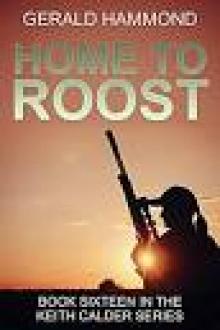 Home to Roost
Home to Roost A Dead Question
A Dead Question Twice Bitten
Twice Bitten The Curse of the Cockers
The Curse of the Cockers In Loving Memory
In Loving Memory Illegal Tender (Three Oaks Book 12)
Illegal Tender (Three Oaks Book 12) Cold Relations (Honey Laird Book 1)
Cold Relations (Honey Laird Book 1)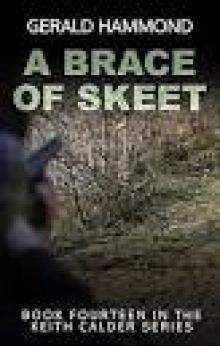 A Brace of Skeet
A Brace of Skeet Silver City Scandal
Silver City Scandal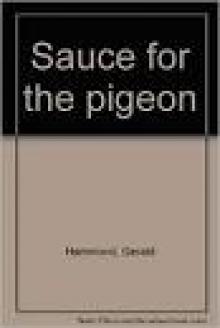 Sauce For the Pigeon
Sauce For the Pigeon Cold Relations
Cold Relations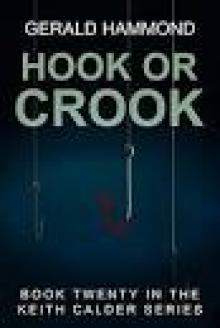 Hook or Crook
Hook or Crook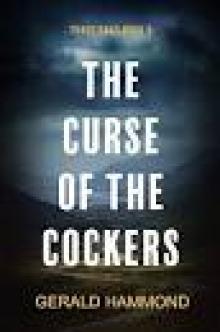 The Curse of the Cockers (Three Oaks Book 5)
The Curse of the Cockers (Three Oaks Book 5)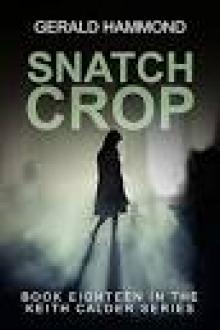 Snatch Crop
Snatch Crop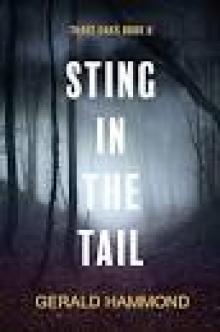 Sting in the Tail (Three Oaks Book 6)
Sting in the Tail (Three Oaks Book 6) A Dead Question (Honey Laird Book 2)
A Dead Question (Honey Laird Book 2) In Loving Memory (Honey Laird Book 3)
In Loving Memory (Honey Laird Book 3) Thin Air
Thin Air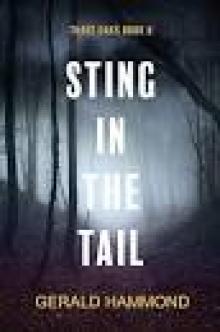 Sting in the Tail
Sting in the Tail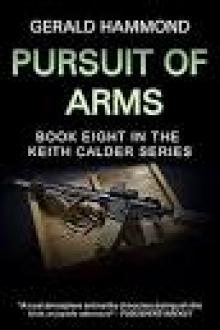 Pursuit of Arms
Pursuit of Arms The Game
The Game Give a Dog a Name (Three Oaks Book 4)
Give a Dog a Name (Three Oaks Book 4) Fair Game
Fair Game The Executor (Keith Calder Book 10)
The Executor (Keith Calder Book 10) Whose Dog Are You? (Three Oaks Book 2)
Whose Dog Are You? (Three Oaks Book 2)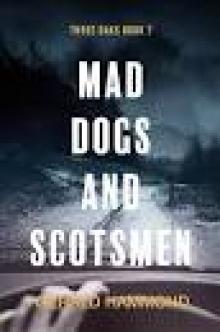 Mad Dogs and Scotsmen (Three Oaks Book 7)
Mad Dogs and Scotsmen (Three Oaks Book 7) Cousin Once Removed
Cousin Once Removed The Worried Widow
The Worried Widow A Shocking Affair
A Shocking Affair Dead Weight (Three Oaks Book 11)
Dead Weight (Three Oaks Book 11) Whose Dog Are You
Whose Dog Are You The Revenge Game
The Revenge Game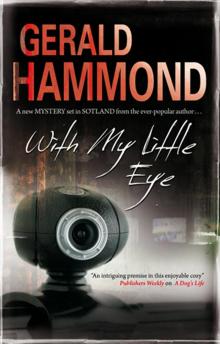 With My Little Eye
With My Little Eye Doghouse (Three Oaks Book 3)
Doghouse (Three Oaks Book 3) In Camera
In Camera Bloodlines (Three Oaks Book 8)
Bloodlines (Three Oaks Book 8)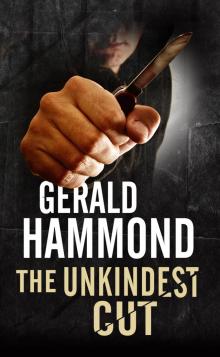 The Unkindest Cut
The Unkindest Cut